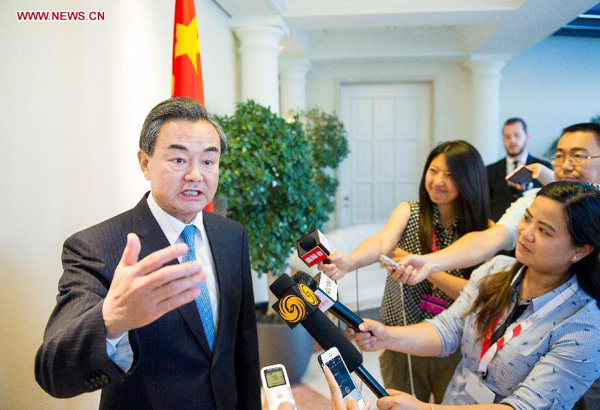VIENNA - A comprehensive Iranian nuclear deal is very likely to be reached after intensive meetings between Iran and six world powers, said Chinese Foreign Minister Wang Yi on Thursday.
|
 |
|
Chinese Foreign Minister Wang Yi is interviewed by media in Vienna, Austria, on July 2, 2015. The basic elements for reaching a comprehensive nuclear deal has been provided, and there should be an accord to be agreed in the final talks, Chinese Foreign Minister Wang Yi told reporters here on Thursday.??[Photo/Xinhua] |
"The possibility of reaching a deal is very high, and a deal should be agreed," Wang told reporters.
Foreign ministers from Iran and P5+1 group are meeting to finalize the possible historic nuclear deal to resolve the decade-old standoff between Iran and Western states.
"I think the basic elements for reaching a comprehensive nuclear deal has been provided, the timing to resolve the Iranian nuclear issue has come," said Wang after meeting with foreign ministers involved in the ongoing nuclear negotiation.
There is "no excuse to stop before the finish line of the Marathon negotiation," he said.
Iran and five UN Security Council permanent members plus Germany have been negotiating over the past 16 months to reach a long-term deal over Tehran's disputed atomic plan.
During the period, Iran agreed to suspend some sensitive nuclear activities. In return, the Western states would partially relief some of the sanctions against Tehran.
After arriving in Austria, Wang held bilateral meetings with Iranian Foreign Minister Mohammad Javad Zarif, US Secretary of State John Kerry and French Foreign Minister Laurent Fabius in Palais Coburg.
Iran and the major powers reached a framework agreement in Lausanne on April 2, which specified many of the key elements of the final deal, but differences exist between Iran and the Western states in its interpretation.
Wang said that the text of the comprehensive deal has basically taken shape, saying there is a general understanding among the convening parties to stick to the Lausanne framework agreement.
Earlier, reports said that Iran may change track on the Lausanne framework, raising concern of a possible setback in the talks.
Despite the optimism, gaps remain in some areas of the talks, especially on the pace and timing of sanction relief.
Progress has been reported in the monitoring and verification issue of Iran's nuclear plan, after International Atomic Energy Agency (IAEA) head Yukiya Amano met with Iranian President Hassan Rouhani in Tehran on Thursday.
Iran will resolve remaining technical nuclear issues in close cooperation with the IAEA in a specific timetable, Rouhani said on the same day.
Rouhani and Amano discussed how to speed up resolution of the concerns about Tehran's past nuclear activities, Iranian media reported.
The IAEA chief also met with Ali Shamkhani, secretary of Iran's Supreme National Security Council.
The real deadline of the deal could be expanded further to July 7 rather than the announced June 30.
If a deal is presented after July 7, the US Congress would have the power to review it for 60 days rather than 30 days, increasing risks for the hard won deal to unravel.